Table of Contents
Get started with MyPerfectResume today!
- Build a resume on any device
- Pick an ATS-friendly template
- Tailor with AI copy suggestions
Why this resume works
- Quantifies accomplishments: Through resume accomplishments, such as a 30% improvement in patient adherence, the applicant conveys their significant impact on healthcare outcomes and operational efficiency.
- Showcases career progression: The applicant’s career trajectory from pharmaceutical care consultant to clinical pharmacist shows a notable rise in responsibility and expertise within the pharmacy sector.
- Illustrates problem-solving ability: Implementing tech solutions that saved $15k showcases the applicant’s problem-solving skills by effectively addressing inefficiencies with innovative approaches.
More Clinical Pharmacist Resume Examples
Browse our clinical pharmacist resume examples to discover how to highlight your healthcare knowledge, patient care skills, and pharmaceutical expertise. These pharmaceutical resume samples will help you craft a resume that impresses potential employers.
Entry-Level Clinical Pharmacist
Why this resume works
- Effective use of keywords: Strategically embedding role-relevant keywords like “medication therapy management” and “pharmacy compliance” ensures the resume is optimized for passing applicant tracking systems (ATS).
- Shows digital literacy: Using tools such as prescription analysis software and clinical auditing platforms, the applicant showcases their computer skills and digital readiness for modern workplaces.
- Centers on academic background: The education section highlights a master’s degree in pharmacy, establishing a robust foundation for professional growth.
Mid-Level Clinical Pharmacist
Why this resume works
- Points to measurable outcomes: By citing a 30% reduction in medication errors, the applicant showcases their impact on patient safety and operational efficiency within healthcare settings.
- Demonstrates language abilities: The applicant’s language skills in Spanish, French, and Mandarin enable effective communication across diverse patient demographics.
- Includes a mix of soft and hard skills: Combining healthcare technology expertise with interpersonal skills, the applicant effectively bridges technical solutions and patient-centric care approaches.
Experienced Clinical Pharmacist
Why this resume works
- Lists relevant certifications: Listing certifications like Certified Pharmacotherapy Specialist and Medication Therapy Management Certification adds depth to the applicant’s expertise, reinforcing their dedication to professional growth.
- Showcases impressive accomplishments: Achieving milestones such as reducing inventory waste by 15% and saving $500K annually reflects a results-driven mindset.
- Emphasizes leadership skills: Introducing an employee training program that boosted efficiency by 30% demonstrates how strong leadership skills can drive team performance and operational success.
Clinical Pharmacist Resume Template (Text Version)
Jin Kim
Spokane, WA 99205
(555)555-5555
Jin.Kim@example.com
Professional Summary
Dynamic clinical pharmacist specialized in optimizing medication regimens enhancing patient outcomes through collaborative strategies and efficient pharmaceutical strategies.
Work History
Clinical Pharmacist
MedPlus Pharmacy Group – Spokane, WA
April 2023 – August 2025
- Optimized regimens, reducing errors by 15%
- Consulted to improve patient adherence 30%
- Led pharmacy audits, ensuring 100% compliance
Medication Therapy Specialist
Trinity Health Services – Eastside, WA
January 2021 – March 2023
- Developed strategies, increasing retention 20%
- Managed inventory, reducing costs by $50k
- Facilitated training, enhancing staff skills
Pharmaceutical Care Consultant
Wellness Pharmacy Solutions – Silverlake, WA
January 2019 – December 2020
- Streamlined processes, boosting efficiency 25%
- Implemented tech solutions, saving $15k
- Conducted workshops, improving outcomes
Skills
- Prescription Management
- Patient Counseling
- Medication Safety
- Pharmaceutical Research
- Healthcare Collaboration
- Regulatory Compliance
- Clinical Data Analysis
- Inventory Control
Education
Doctor of Pharmacy Pharmacy
University of Illinois College of Pharmacy Chicago, Illinois
May 2019
Bachelor of Science Biochemistry
Michigan State University East Lansing, Michigan
May 2015
Certifications
- Certified Pharmacotherapy Specialist – Board of Pharmacy Specialties
- Immunization Certification – American Pharmacists Association
Languages
- Spanish – Beginner (A1)
- French – Beginner (A1)
- German – Intermediate (B1)
Related Resume Guides
Advice for Writing Your Clinical Pharmacist Resume
Discover our tips on how to write a resume for a clinical pharmacist role and learn how to highlight your expertise in medication management, patient care, and collaboration with healthcare teams.
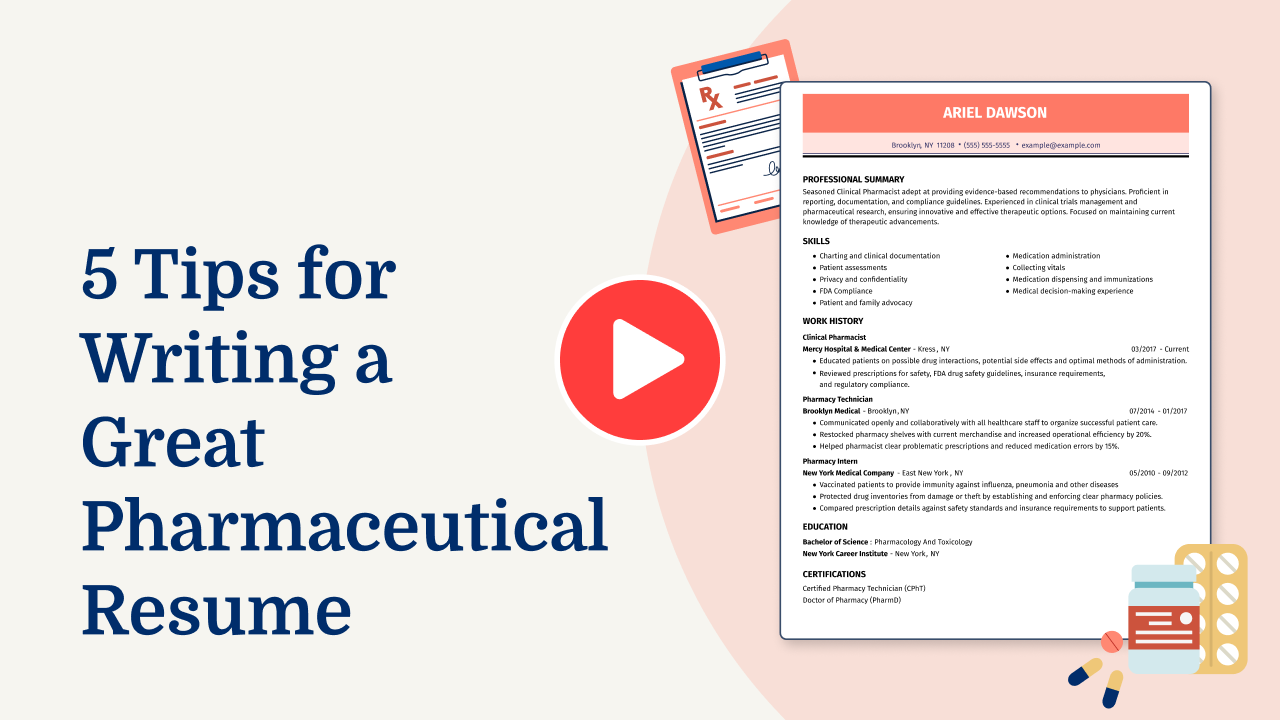
Write a strong professional summary
A professional summary on a resume acts as an introduction for hiring managers, providing them with a quick overview of your qualifications. It’s typically 3-4 sentences that highlight your experience, skills, and achievements.
It is most suitable for experienced applicants like clinical pharmacists who want to showcase their established expertise and value in the healthcare field. The goal is to convey your professional identity and demonstrate what you bring to the table in terms of impact and skill.
In contrast, resume objectives are statements focused on career goals. They are best suited for entry-level applicants, individuals changing careers, or those with employment gaps. Unlike summaries that focus on “what I’ve accomplished,” objectives emphasize “what I aim to contribute.”
Next, we’ll provide examples of both summaries and objectives tailored to various industries and levels of experience.
Clinical pharmacist resume summary examples
Entry-level
Recent Doctor of Pharmacy graduate with a strong foundation in clinical pharmacy and patient care. Completed rotations in hospital and community settings, gaining experience in medication therapy management and patient education. Certified in immunization delivery and eager to contribute to a healthcare team with a focus on improving patient outcomes.
Mid-career
Clinical pharmacist with over seven years of experience in hospital environments, specializing in cardiology and internal medicine. Proven track record of optimizing medication regimens, reducing adverse drug reactions, and collaborating with healthcare teams to improve patient safety. Licensed pharmacist known for exceptional problem-solving skills and dedication to continuous professional development.
Experienced
Seasoned clinical pharmacist leader with extensive expertise in pharmacotherapy for critical care patients. Board-certified pharmacotherapy specialist (BCPS) who has successfully led initiatives to implement evidence-based practices that improved clinical outcomes. Skilled at mentoring junior pharmacists and leading interdisciplinary teams to drive excellence in pharmaceutical care.
Clinical pharmacist resume objective examples
Recent graduate
Enthusiastic clinical pharmacist with a Doctor of Pharmacy degree seeking an entry-level position to apply knowledge in medication management and patient counseling within a collaborative healthcare team. Committed to improving patient outcomes through effective communication and evidence-based practice.
Career changer
Dedicated health professional transitioning into clinical pharmacy, bringing over five years of experience in healthcare administration and patient advocacy. Eager to leverage strong analytical skills and pharmacological expertise to support personalized medication therapy management in a dynamic clinical environment.
Specialized training
Aspiring clinical pharmacist with specialized training in pharmacokinetics and drug interaction analysis, aiming to join a forward-thinking healthcare facility. Passionate about using advanced skills to optimize medication regimens and contribute positively to the interdisciplinary care team.
Highlight your skills as a clinical pharmacist effectively! Use our AI Resume Builder to craft a professional-looking resume with easy-to-use templates that showcase your expertise clearly.
Include relevant certifications and training
Listing certifications and training is key for a clinical pharmacist because it shows your skills and knowledge. When you work in healthcare, having the right credentials can make you stand out. It helps employers see that you’re ready for complex tasks and know how to handle medicines safely. Creating a dedicated certifications section in your resume makes it easier for hiring managers to find this info quickly.
- Board Certified Pharmacotherapy Specialist (BCPS)
- Certified Diabetes Educator (CDE)
- Clinical Pharmacy Practice Certificate
- Advanced Cardiovascular Life Support (ACLS) Certification
- Basic Life Support (BLS) Certification
Putting these certifications on your resume can boost your chances of getting hired as a clinical pharmacist. They show you’re trained in important areas, like managing medication therapy or handling emergencies. Listing them clearly helps prove you’re ready for the challenges of the job.
Example of a certifications section
Board Certified Pharmacotherapy Specialist (BCPS)
Issued by: Board of Pharmacy Specialties
Expires 2025
Certified Diabetes Educator (CDE)
Issued by: National Certification Board for Diabetes Educators
Issued 2022
Immunization Delivery Certification
Issued by: American Pharmacists Association (APhA)
Issued 2021
Advanced Cardiovascular Life Support (ACLS) Certification
Issued by: American Heart Association
Expires 2026
Choose a resume template with clear sections, plenty of whitespace and standard fonts to ensure your resume passes ATS and lands in recruiters’ hands.
Showcase your work experience
Showcasing relevant work experience on a resume is important for a clinical pharmacist because it helps potential employers see what you’ve done in the past and how you can contribute to their team. It’s essential to format your work history in reverse chronological order, starting with your most recent job.
This approach makes it easy for employers to see your career progression and current skills. Begin each entry with your job title, followed by the name of the employer, location, and employment dates to provide clear information at a glance.
Using action-oriented language is key when describing roles as a clinical pharmacist. Focus on achievements rather than just listing duties. For instance, instead of saying “responsible for medication management,” you could say “managed medication therapy for over 100 patients monthly, resulting in improved health outcomes.”
Including measurable results like this demonstrates impact clearly. Highlight core responsibilities such as patient counseling, drug interaction checks, and collaboration with healthcare teams to showcase abilities effectively.
Including specific job-related skills is important too. Mention tasks like reviewing prescriptions for accuracy or advising on dosage adjustments that show preparedness for the role of clinical pharmacist. By emphasizing these aspects and using concrete examples from previous positions, you’ll present yourself as someone who has both experience and the ability to make meaningful contributions in future roles.
5 clinical pharmacist work history bullet points
- Conducted comprehensive medication reviews for over 150 patients monthly, improving medication adherence by 25%.
- Collaborated with healthcare teams to develop patient-specific treatment plans, leading to a 15% reduction in hospital readmissions.
- Implemented a new drug utilization review process, identifying and resolving over 200 potential drug interactions annually.
- Trained and mentored 10 pharmacy interns, improving their clinical skills and knowledge in evidence-based practices.
- Managed the procurement and inventory of high-cost medications, reducing waste by 20% and saving $50,000 annually.
A resume format highlighting patient care, medication management, and collaboration with healthcare teams can distinguish clinical pharmacists.
Match your resume with the job description
Tailoring resumes to job descriptions is important for job seekers who want to stand out and pass through ATS. These systems scan resumes for specific keywords and phrases found in job postings, so customizing your resume can increase your chances of getting noticed by employers.
An ATS-friendly resume includes keywords that match the skills required for the job. By incorporating relevant terms from the job description, applicants can improve their chances of catching the attention of hiring managers.
To identify keywords in a job posting, look for repeated mentions of skills, qualifications, and duties. For a clinical pharmacist role, examples might include “patient care,” “clinical assessments,” or “healthcare team collaboration.” Using these exact phrases helps make your resume more searchable by ATS.
Incorporate these terms naturally into your resume content by rewriting job descriptions. For instance, change “provide high-quality patient care” to “delivered high-quality patient care to improve overall health outcomes.” This shows you have done what the employer wants.
Targeted resumes are beneficial because they align closely with ATS requirements, increasing your likelihood of advancing in the recruitment process.
Catch those easy-to-fix mistakes before you send your resume! Try our ATS Resume Checker to find formatting issues, missing keywords, and layout problems that could hurt your chances of getting the job.
FAQ
Do I need to include a cover letter with my clinical pharmacist resume?
Yes, including a well-written clinical pharmacist cover letter with your resume can make your application more compelling and tailored to the role.
A cover letter gives you the opportunity to highlight your expertise in pharmacotherapy, patient counseling, or collaboration with healthcare teams while addressing specific needs of the pharmacy or hospital.
For instance, if the organization specializes in oncology or cardiology care, you can emphasize your relevant experience working in those areas or managing specialized medications.
To simplify this process, try using a Cover Letter Generator to create a customized cover letter that aligns with both your resume and the job description.
Additionally, reviewing our collection of clinical pharmacist cover letter examples can help you understand how to effectively structure and present your qualifications.
How long should a clinical pharmacist’s resume be?
For a clinical pharmacist, a one-page resume is often effective for highlighting key qualifications like pharmacy management skills, patient counseling expertise, and skill in medication therapy. Keep it focused on recent roles and strong achievements to make a strong impression.
If you have extensive experience or specialized credentials, moving to a two-page resume can be beneficial. Use this space wisely to include detailed information about your involvement in clinical research projects or advanced certifications.
Consider exploring our guide on how long a resume should be for more insights into tailoring the length of your resume to suit your career stage.
How do you write a clinical pharmacist resume with no experience?
When crafting a resume with no experience for a clinical pharmacist position, emphasize your education, relevant skills, and practical training to demonstrate your preparedness for the job. Follow these tips:
- Emphasize your education: Start with your pharmacy degree, including the name of your school, graduation date, and any honors or awards. Make sure to include coursework or projects that are particularly relevant to clinical pharmacy.
- Include internships and rotations: Detail any internships or clinical rotations you completed during your studies. Describe the setting, tasks you performed, and skills you developed such as patient counseling, medication therapy management, or working within a healthcare team.
- Highlight relevant skills: List any specific skills you’ve gained through volunteer work, part-time jobs in healthcare settings, or even related coursework. Skills like pharmaceutical calculations, drug interaction analysis, and familiarity with electronic health records are valuable.
Rate this article
Clinical Pharmacist
Share this page
Additional Resources
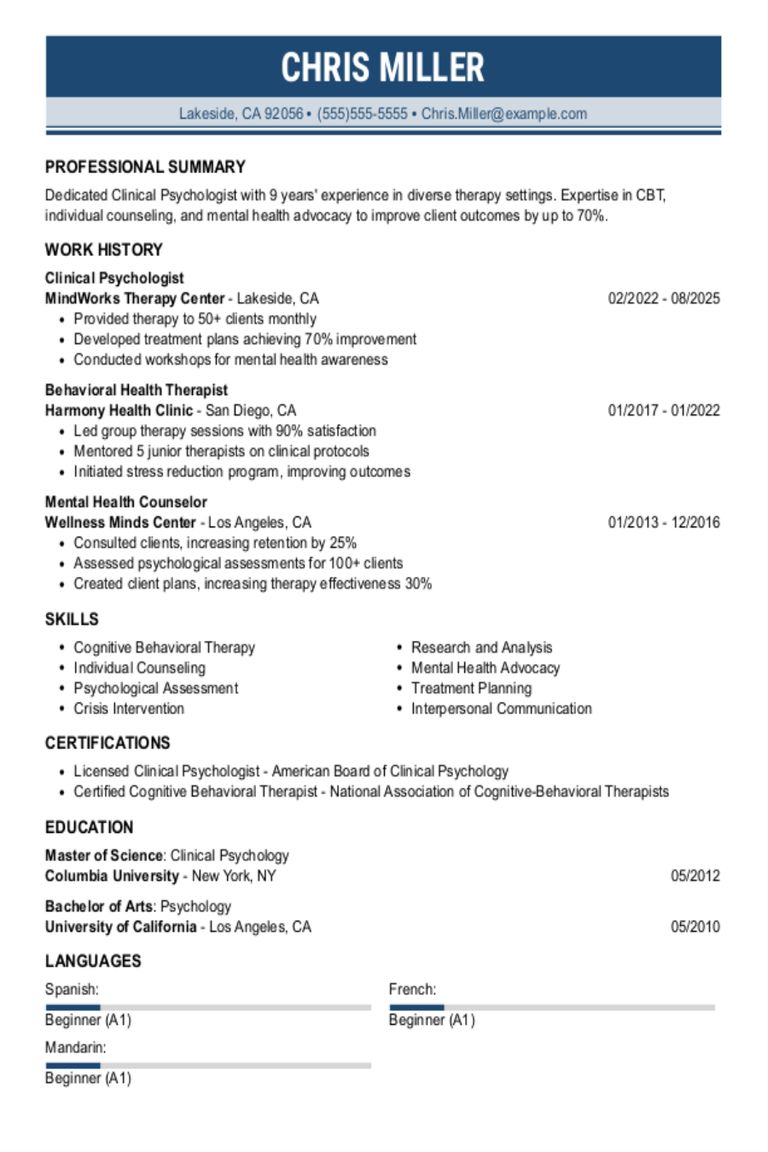
Clinical Psychologist Resume Examples & Templates
Explore clinical psychologist resumes that highlight patient care, therapeutic techniques, and case management. Learn how to highlight your empathy, experience, and readiness to support mental health needs to stand out
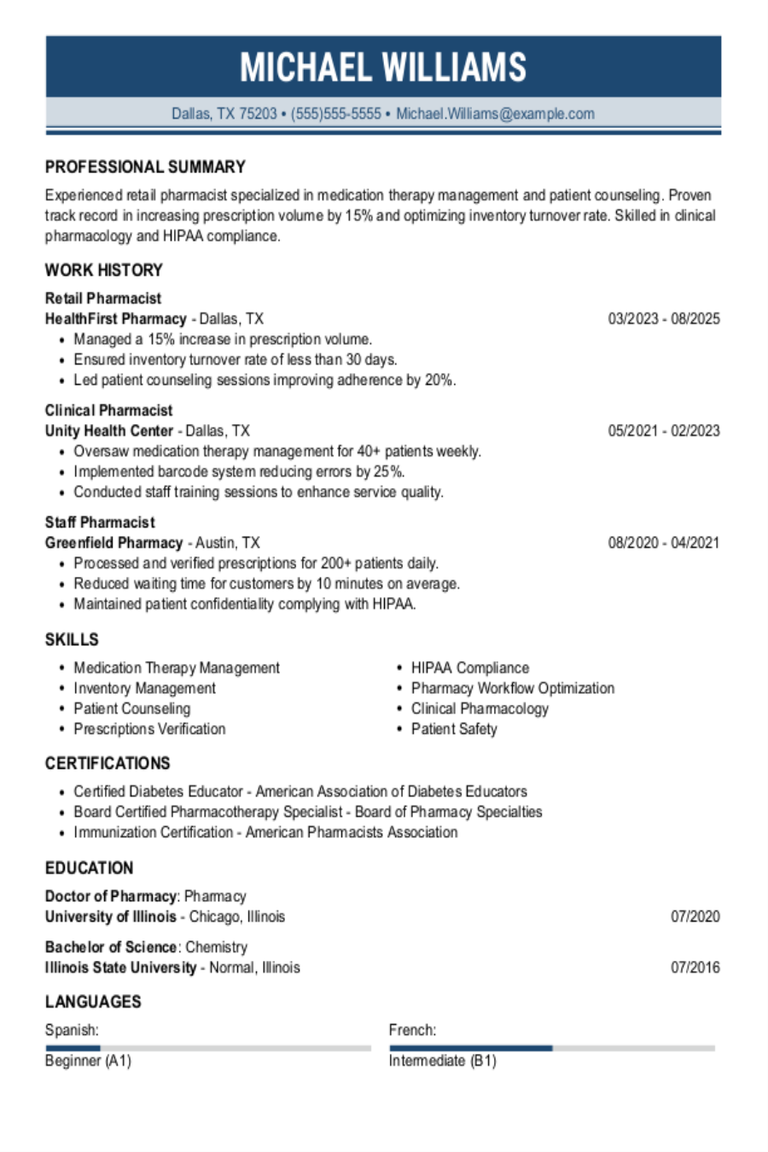
Retail Pharmacist Resume Examples & Templates
Browse retail pharmacist resume examples that show how to spotlight your customer service and medication management skills. Use these tips to clearly show your experience in helping customers and managing
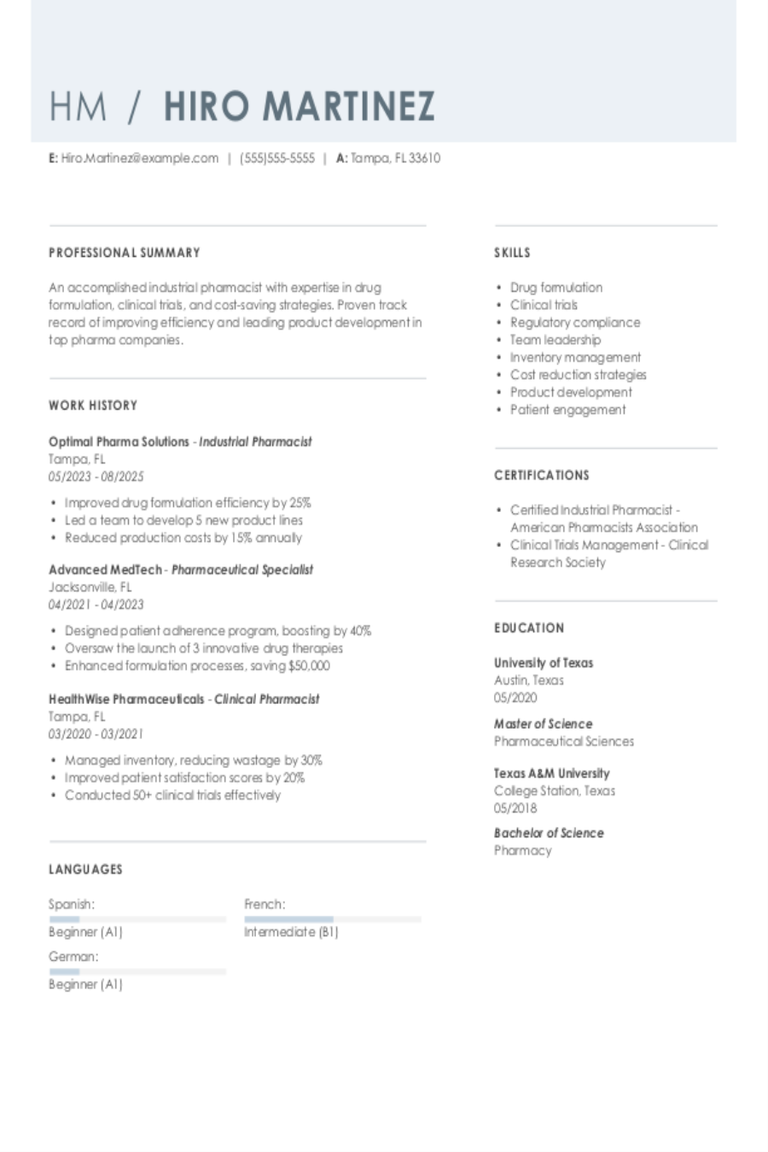
Industrial Pharmacist Resume Examples & Templates
Explore industrial pharmacist resume examples and find tips on highlighting key skills and experiences that make you stand out in the pharmaceutical industry.Build my resumeImport existing resumeCustomize this templateWhy this
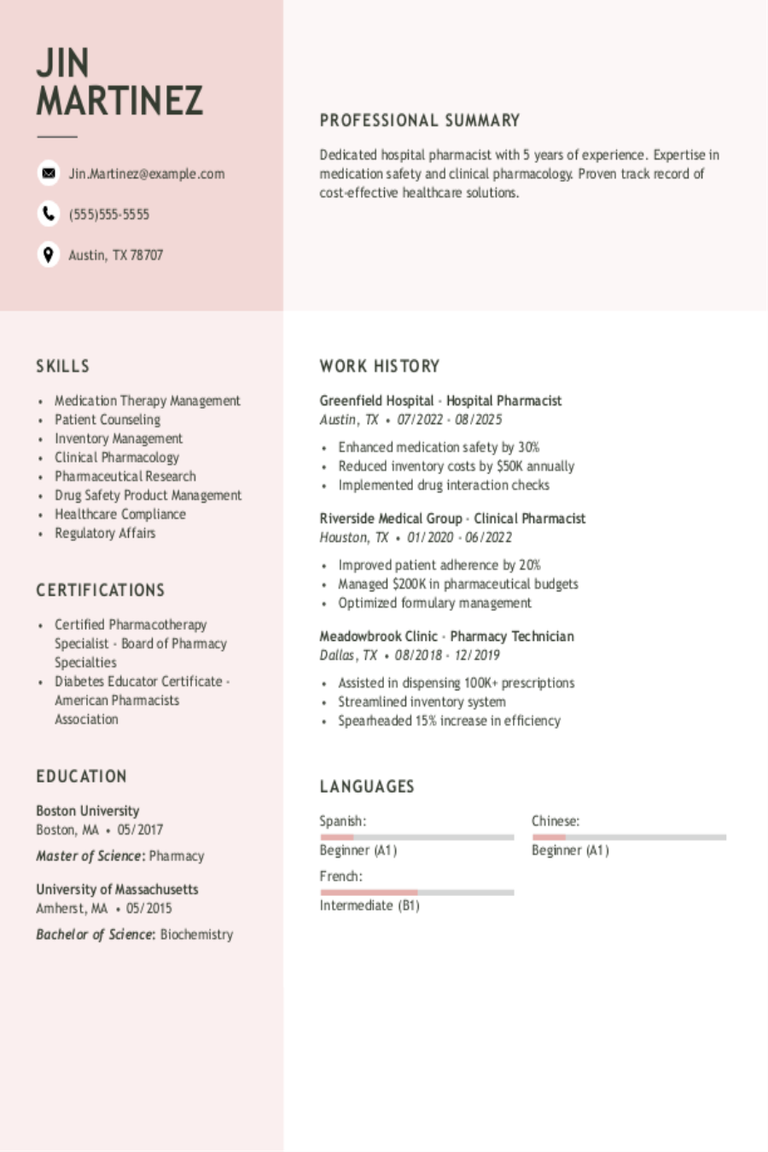
Hospital Pharmacist Resume Examples & Templates
Explore hospital pharmacist resume examples and learn how to show employers you’re detail-oriented, knowledgeable about treatments, and ready to support healthcare teams.Build my resumeImport existing resumeCustomize this templateWhy this resume
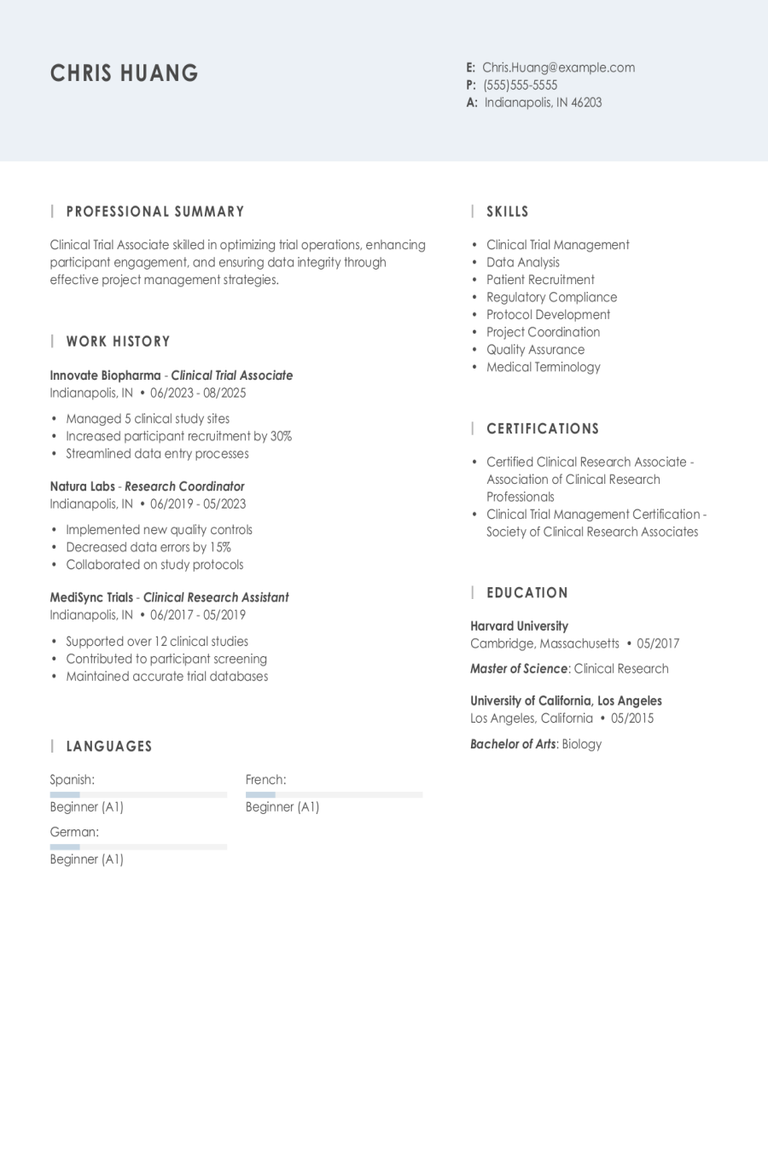
Clinical Trial Associate Resume Examples & Templates
Explore how clinical trial associates showcase their ability to manage studies and coordinate with teams. These examples and tips will help you highlight your skills in tracking data and ensuring
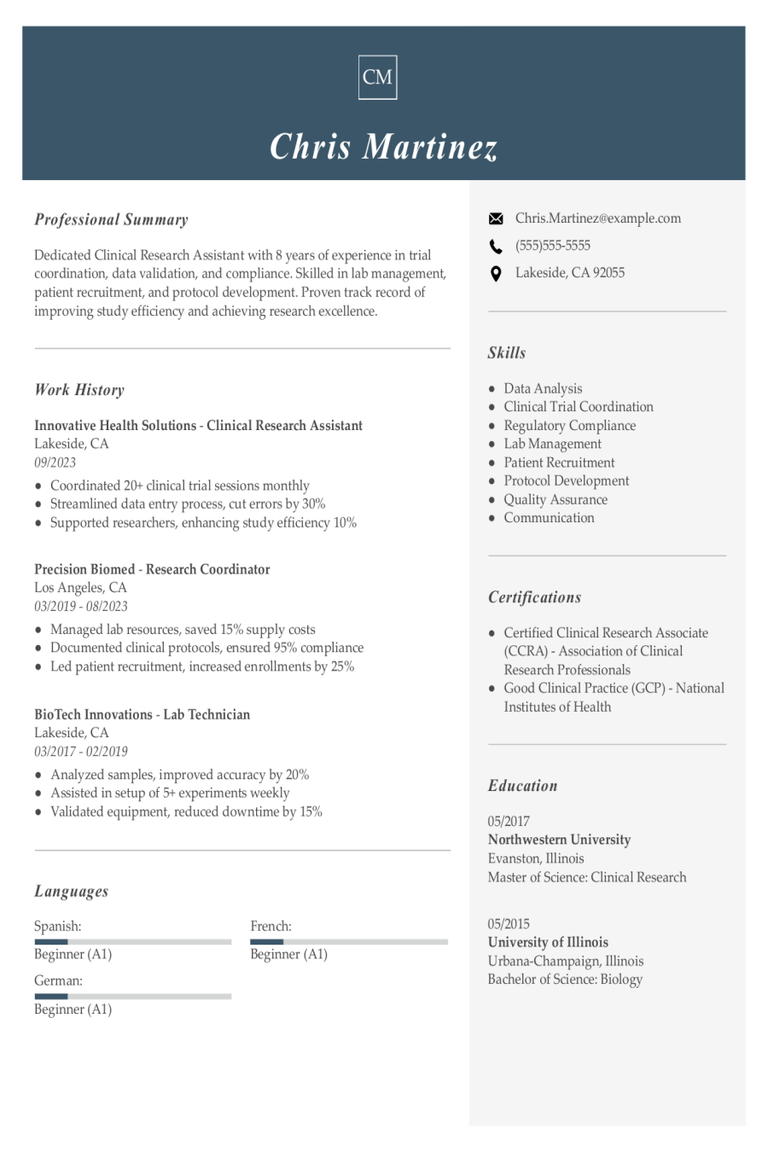
Clinical Research Assistant Resume Examples & Templates
Explore clinical research assistant resume examples to see how to write about collecting data, managing records, and supporting clinical trials. Learn how to highlight your role in helping researchers stay
